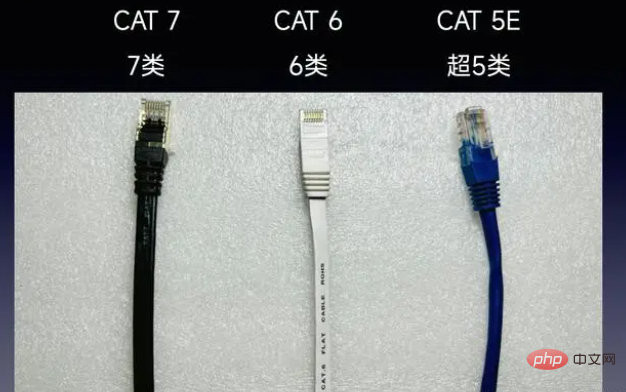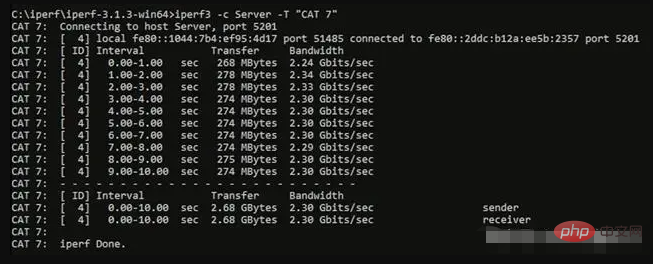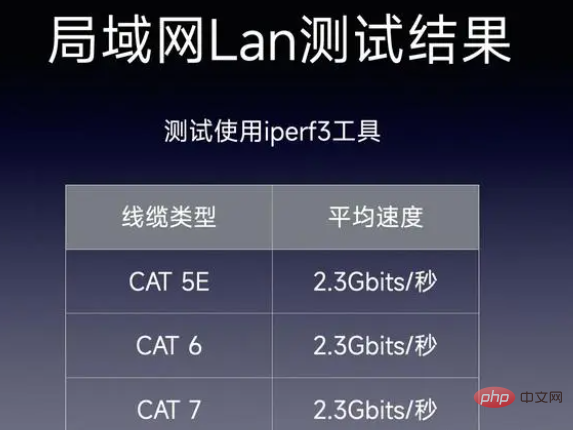What network cable to use for 2.5g network port?
The 2.5g network port uses Category 5e network cables and can be connected to Gigabit network cables. The 2.5G port is a network interface with a rate of 2.5Gbps. The actual rate is usually calculated as 2500Mbps; and the Category 5e network cable (cat 5e) can fully meet the transmission requirements of 2.5Gbps and 1000Mbps. Category 5e unshielded twisted pair is a cable that has improved some of the performance of Category 5 shielded twisted pair. Many performance parameters, such as near-end crosstalk, attenuation to crosstalk ratio, return loss, etc., have been improved. But its transmission bandwidth is still 100MHz.

The operating environment of this tutorial: Windows 7 system, Dell G3 computer.
Generally speaking, the 2.5g network port uses a Category 5e network cable and can be connected to a Gigabit network cable.
Nowadays, basically all cables are Category 5e. The quality of the cable depends on the distance. Nowadays, many low-quality cables, such as copper-clad aluminum/iron, have shorter distances. The 2.5G standard defines Category 5e cables. application scenarios.

What is the 2.5G interface?
The 2.5G port is a network interface with a rate of 2.5Gbps. The actual rate is usually calculated as 2500Mbps. Converted into a value we can better understand, the network download or upload rate is approximately 312.5MB/s.
The highest speed broadband we can get is usually 1000Mbps. Of course, some cities in China have opened 2000Mbps broadband pilots, and the calculated speed is 250MB/s. It has not reached the limit of 2.5Gbps ports, but it is relatively close. But in fact, the current way to achieve 2000Mbps home broadband is multi-dial, that is, two 1000Mbps broadbands are aggregated together, and few provide a single 2.5G port. Therefore, most users who apply for 2000Mbps broadband will get an optical modem with two 1000Mbps ports.
In other words, even if we have a router with a 2.5Gbps interface, there is no way to make 2000Mbps broadband work. For 2000Mbps broadband users, a more practical option is to buy a router that supports dual WAN. A single port rate of 1000Mbps is enough.
The more practical value of the 2.5G port is actually the intranet (LAN)
The intranet mentioned here is mainly the home LAN Internally, simply speaking, it is a network composed of multiple networked devices on a router, which can transmit data to each other. Even if we unplug the optical modem, it will not affect the operation of the intranet. In scenarios where the intranet requires network speeds exceeding 300MB/s, NAS is naturally the solution.
NAS is a private network disk, and the bottleneck of file transfer rate is usually the interface and network card. Network cables are also the most easily overlooked part.
However, for mechanical hard disks, the theoretical speed of a single disk is up to about 200MB/s, and solid-state hard disks are faster. Gigabit network ports theoretically cannot meet the demand. Moreover, in wireless scenarios, it is not uncommon for mobile phones and computers that support WiFi6 to run network speeds exceeding 2000Mbps. At this time, the router's Gigabit port can easily become a bottleneck.
So based on the current usage scenario, the more practical use of the router's 2.5G port is as a LAN port for NAS or NAS-like devices (file servers or databases). The cost of upgrading 2.5G network cards for this type of equipment is not very high.
iperf3 tests whether Category 5e, Category 6 and Category 7 network cables can support 2.5Gbps bandwidth
##Category 5e CAT 5E

Category 6 CAT 6

Category 7 CAT 7


Expand knowledge:
Category 5e cable refers to Category 5e unshielded twisted pair (UTP—Unshielded Twisted Pair) and shielded twisted pair (STP—Shielded Twisted Pair), which are upgraded versions of Category 5 cable. Category 5e unshielded twisted pair cable is a cable that appears after improving some of the performance of the existing Category 5 shielded twisted pair cable. Many performance parameters, such as near-end crosstalk, attenuation crosstalk ratio, return Wave loss, etc. have improved, but its transmission bandwidth is still 100MHz. The logo of Category 5 line is "CAT5", with a bandwidth of 100M, and is suitable for networks below 100M; the logo of Category 5e cable is "CAT5E", with a bandwidth of 155M, which is a mainstream product; the logo of Category 6 line It is "CAT6" with a bandwidth of 250M. It is used to set up Gigabit network and is the future development trend. For more related knowledge, please visit theFAQ column!
The above is the detailed content of What network cable to use for 2.5g network port?. For more information, please follow other related articles on the PHP Chinese website!

Hot AI Tools

Undresser.AI Undress
AI-powered app for creating realistic nude photos

AI Clothes Remover
Online AI tool for removing clothes from photos.

Undress AI Tool
Undress images for free

Clothoff.io
AI clothes remover

AI Hentai Generator
Generate AI Hentai for free.

Hot Article

Hot Tools

Notepad++7.3.1
Easy-to-use and free code editor

SublimeText3 Chinese version
Chinese version, very easy to use

Zend Studio 13.0.1
Powerful PHP integrated development environment

Dreamweaver CS6
Visual web development tools

SublimeText3 Mac version
God-level code editing software (SublimeText3)

Hot Topics
 1377
1377
 52
52
 What network cable to use for 2.5g network port?
Mar 20, 2023 pm 02:09 PM
What network cable to use for 2.5g network port?
Mar 20, 2023 pm 02:09 PM
The 2.5g network port uses Category 5e network cables and can be connected to Gigabit network cables. The 2.5G port is a network interface with a rate of 2.5Gbps. The actual rate is usually calculated as 2500Mbps; and the Category 5e network cable (cat 5e) can fully meet the transmission requirements of 2.5Gbps and 1000Mbps. Category 5e unshielded twisted pair is a cable that has improved some of the performance of Category 5 shielded twisted pair. Many performance parameters, such as near-end crosstalk, attenuation to crosstalk ratio, return loss, etc., have been improved. But its transmission bandwidth is still 100MHz.
 What types of network cables are hsyv-6?
Jul 12, 2022 pm 02:03 PM
What types of network cables are hsyv-6?
Jul 12, 2022 pm 02:03 PM
"hsyv-6" is Category 6 twisted pair (network cable); hsyv means twisted pair, and "6" means CAT6, which is Category 6. Category 6 network cable supports up to Gigabit network, which is 100M Category 5 An upgraded version of the network cable, the Category 6 twisted pair is somewhat different from the Category 5 or Category 5e twisted pair in appearance and structure. It not only adds an insulated cross frame, but also separates the four pairs of twisted pairs. in the four grooves of the cross frame, and the diameter of the cable is also thicker.
 Is the Category 6e cable marked 6e or 6a?
Oct 28, 2022 pm 02:06 PM
Is the Category 6e cable marked 6e or 6a?
Oct 28, 2022 pm 02:06 PM
The logo of Category 6e network cable is 6a, and its complete logo is CAT6A; CAT6E is an improved version of CAT6, but not CAT6A; Category 6e network cable and Category 6 network cable generally have a cross skeleton with insulating effect added to the internal structure, and will Arrange 4 pairs of twisted pairs in the 4 grooves of the cross frame respectively. However, the cross frame inside the Category 6e network cable generally uses a gear-shaped cable trough shape, while the cross frame of the Category 6 network cable is generally a straight line. Isolated.
 What types of network cables are hsyv-5e?
Mar 06, 2023 pm 03:10 PM
What types of network cables are hsyv-5e?
Mar 06, 2023 pm 03:10 PM
hsyv-5e is a Category 5e network cable; hsyv represents the structure of the line, and 5e represents Category 5e. Its transmission frequency is as high as 100MHz. It is a Gigabit network cable and can be used in Gigabit networks, and the hsyv-5e center line The twist of the pair is denser, the signal transmission is faster, the quality is better, and the durability is better.
 What should I do if the network cable is plugged in but the network cannot be recognized?
Jul 05, 2023 pm 03:47 PM
What should I do if the network cable is plugged in but the network cannot be recognized?
Jul 05, 2023 pm 03:47 PM
There are three solutions to the problem that the network cable is plugged in but the network cannot be recognized: 1. Unplug the network cable and restart the router; 2. Press Win+X, select Settings, click Network and Internet, select Ethernet and click Change Adapter Options, click After selecting Disable Local Connection, click again to select Enable; 3. Click Status in the Network and Internet interface, then select Network Reset in the pop-up interface, click Reset Now, and then the computer will restart within 5 minutes to complete the reset.
 What kind of network cable is hsyu5e?
Oct 21, 2022 am 09:31 AM
What kind of network cable is hsyu5e?
Oct 21, 2022 am 09:31 AM
hsyu5e is a Category 5e twisted pair, which has the characteristics of small attenuation and less crosstalk, and has higher attenuation to crosstalk ratio (ACR) and signal to noise ratio (signal to noise ratio), smaller delay difference, high performance greatly improved. The transmission frequency of hsyu5e is as high as 100MHz. It is a Gigabit network cable and can be used in Gigabit networks. The twisting degree of the wire pairs in hsyv5e is relatively dense, so the signal transmission is fast, the quality is better, and the durability is better.
 4pairs are several types of network cables
Nov 22, 2022 am 11:52 AM
4pairs are several types of network cables
Nov 22, 2022 am 11:52 AM
4pairs is Category 5 network cable. Category 5 cable is a twisted pair cable used in computer networks. It is also a multimedia cable used for data, voice and other information communication services. It is widely used in Ethernet and broadband access projects. Its quality is directly related to to the transmission quality of information communications.
 What is the line sequence of Class B network cables?
Mar 03, 2023 am 11:01 AM
What is the line sequence of Class B network cables?
Mar 03, 2023 am 11:01 AM
The line sequence of class b network cable refers to the line sequence of class b network cable. According to the standard wiring of T568B, 12345678 is orange and white, orange, green and white, blue, blue and white, green, brown and white, and brown. Both ends of the network cable follow this Prepare the crystal head in line sequence.



